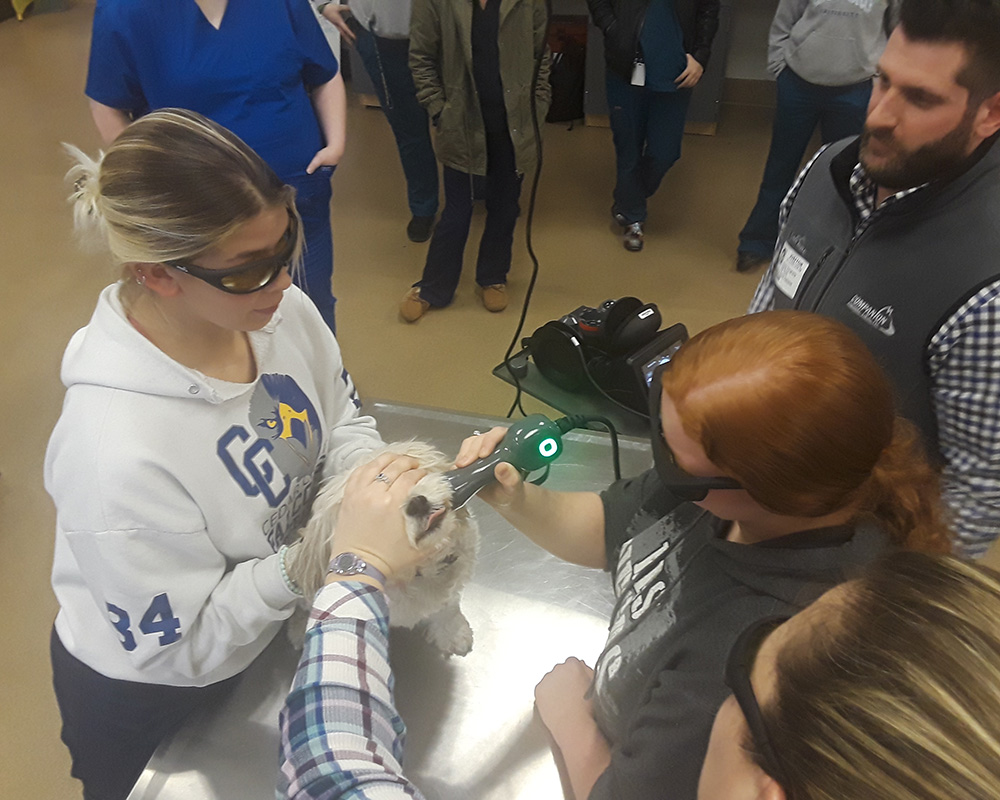Impact Story
Veterinary Technology Program
Vet Tech Program Instructors

We instructors in the Vet Tech Program have much to be excited about. When our students begin their education with us, they often lack confidence and a true understanding of the career of Veterinary Technology. What excites us most is seeing our students grow in knowledge and self-confidence through the practice of technical skills, using some of the most innovative technology in the field.
Tammy Kramer, CVT
Program Director
of Veterinary Technology
Jessie Masquelier, BS, CVT
Veterinary Technology Instructor
Thomas Wilson, VMD
Veterinarian/Veterinary
Technology Instructor
How do you help students gain real-world experience?
The LCCTC adult Vet Tech Program provides students hands-on learning opportunities with animals of many species including birds, rats, cats, dogs, horses, cattle, etc. We even keep rats and cats on campus for students to provide routine care for daily.
The Program works closely with the local PA Boxer Rescue organization that provides us with dogs weekly. The students prepare the dogs for adoption by providing physical exams, vaccinations, blood work, radiographs, and socialization. In the spring term the students also train in surgery and anesthesia and assist in spay/neuter procedures to make the animals more adoptable at a reasonable cost to the rescue.
Our Program also gives students practical experience by inviting guest speakers knowledgeable in diverse aspects of the veterinary profession. We take students on field trips to multiple clinics and sites, including New Bolton Center at the University of Pennsylvania. Students also gain experience by using animal simulators to hone their technical skills before practicing on live animals.
How has this Foundation supported your program?
The Foundation has assisted our program beyond measure through its Innovation Grants that provide our students with exceptional experiences using the latest technology in the industry.
We are fortunate to have been awarded multiple grants from the Foundation: a new portable ultrasound to train students on the latest technology; a cold therapeutic laser that provides innovative post-operative pain relief for animals; Wi-Fi teaching microscopes where images seen in lab can be saved on students’ phones; portable x-ray software that takes the technology to the patients; animal simulators, such as bandaging legs, that allow students to perfect their bandaging skills before practicing on live animals. Students provided with this up-to-date training in Veterinary Technology can help veterinarians advance their scope of practice by assisting team members in implementing innovative equipment.
How has this support from the Foundation impacted your program and/or students?
The Foundation grants have been integral in providing our students with the most innovative technology in our field and the Foundation also supported one of our students in need of financial assistance.
Training with groundbreaking technology not only advances our students’ studies, but also enhances their future careers in Veterinary Technology. The skills our students develop using the most advanced equipment will be an asset to the profession. We instructors are proud to provide the best education for our students and this is made possible because of The Foundation.